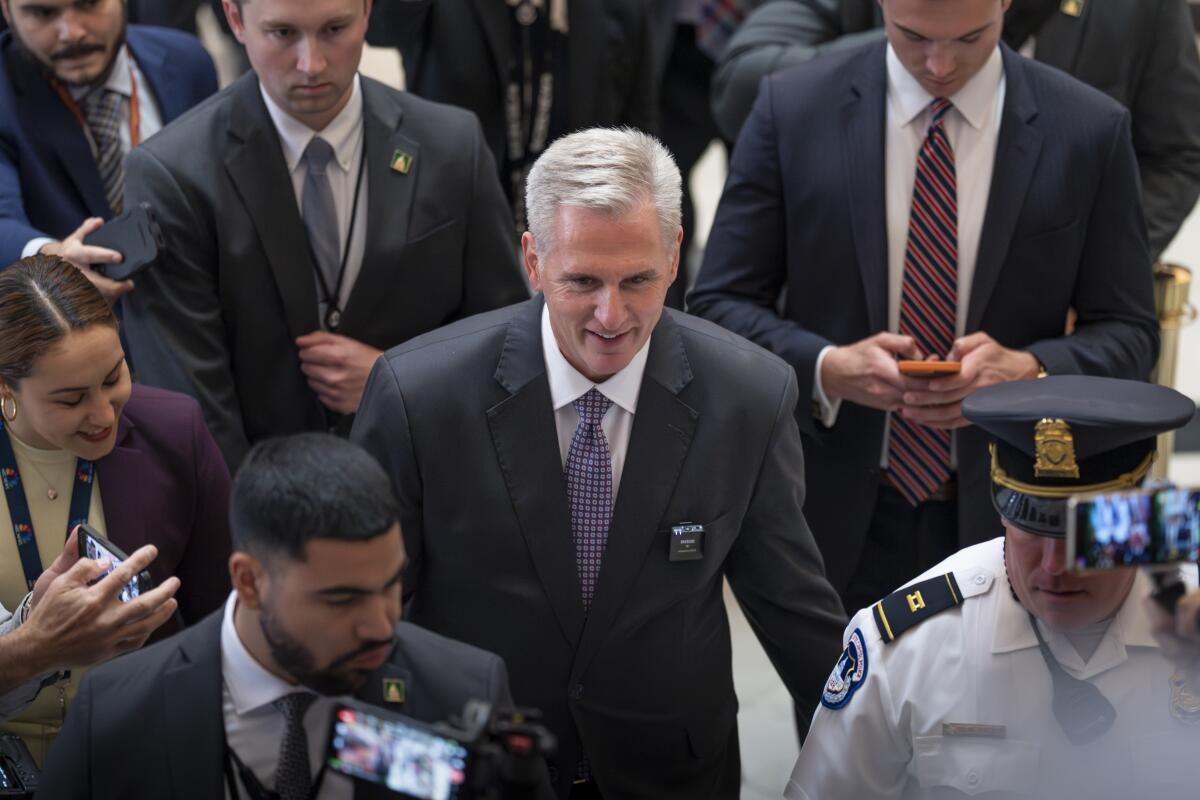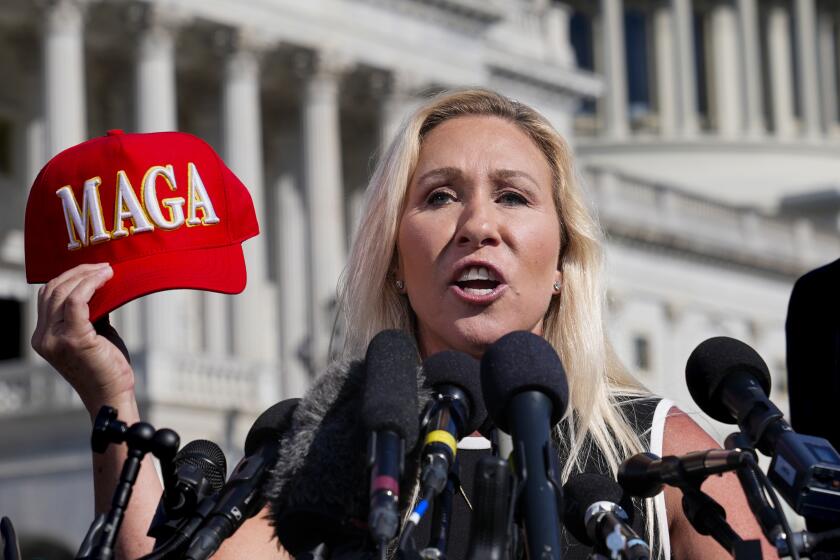House approves bipartisan deal to suspend debt limit, reducing fear of U.S. default

The U.S. House of Representatives overwhelmingly approved a deal to suspend the debt limit late Wednesday, reducing the risk of a potentially disastrous default. To eliminate that risk, the Senate must pass the bill and send it to President Biden for his signature before the Treasury runs dry, which could happen as early as Monday.
The House approved the deal, which is a product of weeks-long negotiations between President Biden and House Speaker Kevin McCarthy (R-Bakersfield), by a 314-117 vote after 9 p.m. EDT Wednesday. The legislation, which will cap some nondefense spending and suspend the debt ceiling for two years, will cut approximately $1.5 trillion from the federal deficit over the next decade, according to the nonpartisan Congressional Budget Office.
The bill now heads to the Senate, where it has support from leadership in both parties and is expected to pass as early as Thursday.
Biden and McCarthy’s compromise allowed the federal government to dodge a crisis, and was a political victory for both men. The president reinforced his brand as a bipartisan deal maker, and the speaker got Biden to bargain after he refused to do so for weeks.
Both leaders won something for their parties. Republicans, who had criticized Biden’s repeated extension of a Trump-era pandemic pause of federal student loan payments, ensured that the president will not unilaterally extend that pause beyond the end of August. The deal also included another top GOP goal: A $20-billion cut from the $80 billion in new funding Democrats had sent to the Internal Revenue Service as part of an effort to rein in wealthy tax cheats.
Democrats secured a suspension of the debt ceiling, ensuring that Biden will not face this politically risky situation while he’s running for reelection. In a surprise twist, they also appear to have won an increase to food-stamp funding: Although new work requirements will apply to some recipients, new exceptions for homeless people, certain former foster children and veterans will result in net increases in enrollment in the program, the Congressional Budget Office estimated this week.
But the deal left bitter feelings on both sides, and prompted warnings of future trouble.
Colorado Rep. Ken Buck, a member of the archconservative Freedom Caucus, which tried and failed on Tuesday to scuttle the bill, suggested that Republicans should try to boot McCarthy from the speakership over the debt limit bargain. Republicans’ majority in the house is narrow, and McCarthy secured the speakership only on a historic 15th vote in January by making concessions to hard-line Republicans that make it easier to remove him from power.
In an interview Wednesday afternoon, Buck said that McCarthy further soured his relationship with the Republican conference by relying on Democratic votes to pass a procedural rule ahead of the final vote.
“It didn’t help, right in there,” Buck told The Times as he walked off the House floor after the vote. “Democrats voting for the rule because he couldn’t get the vote for the rule.”
In a rare demonstration of their differences on policy, the three House Democrats vying to replace Sen. Dianne Feinstein in 2024 split on the deal, with Rep. Barbara Lee of Oakland and Rep. Katie Porter of Irvine voting no. “I will stand with other progressives that are holding the line for the Democratic Party’s core values,” Lee said in a statement.
Rep. Adam B. Schiff of Burbank, who is closest to Democratic leadership, voted for the bill.
Schiff described the debt ceiling deal as “far from perfect” but said he “voted to stand with California families who would have been devastated by a disastrous default.”
This schism will lend ammunition to the charge that Schiff is less progressive than his opponents. Earlier this year, The Times reported that Schiff withdrew his application to join the Congressional Progressive Caucus after it proved divisive among the group’s members.
Democrats also complained that Biden gave in to McCarthy and bartered over the nation’s debt ceiling.
Rep. Jared Huffman (D-San Rafael), who voted against the bill, said it was a “terrible precedent” to allow “MAGA Republicans” to use the nation’s debt limit as a bargaining chip over spending.
“There’s no going backwards,” Huffman said. “There’s a reason when you go camping they tell you not to feed the bears. Even when you give them a little marshmallow, something really bad is going to happen.
“We fed the bears,” Huffman said. “I’m sure this won’t be the end of it.”
Many of the 46 Democrats who voted against the bill offered similar warnings or complained about the merits of the bill. In a phone interview with The Times ahead of the vote, Los Angeles Rep. Sydney Kamlager worried about the cuts to IRS funding.
“The irony is not lost on me that the last man who was in the White House was notorious for not paying taxes, and actually planted this seed of the IRS being bad news,” she said. “When we have talked about going after folks who are trying to scam the government and get something for nothing, the fact that now they want to defund the IRS is unbelievable.”
Still, large majorities of both parties ultimately supported the bill. The final tally of GOP votes was 149 yes and 71 no, while among Democrats it was 165 to 46.
In a news conference after the vote, McCarthy said it was “great” and “fabulous” that more Democrats voted for the deal than Republicans. “I’m already thinking of other bills to bring to the floor because they just said they’d vote for it,” he said.
In a statement, Biden praised the deal’s passage, saying the deal meets the “test” of “bipartisan compromise.” The president also said the compromise “protects key priorities and accomplishments from the past two years, including historic investments that are creating good jobs across the country.”
All of the Democratic leadership backed the deal, and GOP Rep. Gary Palmer of Alabama was the only member of Republican leadership to oppose it.
Rep. Darrell Issa (R-Bonsall) said that the bill was “better than expected” and praised McCarthy for his negotiations, pointing out that Republicans had been happy to spend freely when they had unified control of government under President Trump and that previous Republican speakers hadn’t achieved similar deals with Democratic presidents.
“He did better than any of his predecessors, and he had less in his hand to play with,” he said. “I mean, John Boehner, with the House and Senate, did not get bills that were as balanced as this one. As matter of fact, you know, if you really look at it, you know, during the Trump era, where was the austerity?”
Rep. Scott Peters (D-San Diego) called the deal a “fair agreement” and predicted it would pass with strong bipartisan support.
“Both sides got something to talk about. We got a little bit of substance. It’s not life-changing. You know, we should never have messed around with the full faith and credit of the United States, but it looks like we have a chance to preserve it,” he told The Times on Wednesday as he walked off the House floor.
Peters gave McCarthy credit for a capable round of negotiations.
“He’s a survivor. So I think he’s come up with something that is pretty plausible for both sides. So credit to him, and to the president.”
Joseph is a special correspondent. Times staff writer Benjamin Oreskes contributed to this report.
More to Read
Get the L.A. Times Politics newsletter
Deeply reported insights into legislation, politics and policy from Sacramento, Washington and beyond. In your inbox three times per week.
You may occasionally receive promotional content from the Los Angeles Times.









